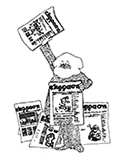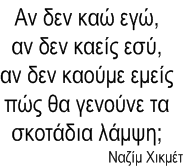Neşe Yaşin*
My father often says
love your homeland
My homeland has been divided in two
Which of the two parts should I love?
The above verses have become the “national anthem” of those who struggle for the reunification of Cyprus, of those for whom division and intolerance constitute an absurdity that has to be ended. It is a battle march in the struggle for peace and understanding between Greek and Turkish Cypriots. And it may be the best moment of Cypriot poetry that has engaged with the national question in Cyprus. It is no coincidence that these verses are in the lips and soul of Cypriots, both in the north and in the south.
We usually say that culture unites people. Neşe’s poetry is a brilliant example of this truth. These four verses condense the feelings of a whole generation of Greek and Turkish Cypriots to an extent and depth that no analysis could ever provide, condensing them in a way that unites. It is exactly at this point that Neşe is different. For there are many Cypriot poets who have dealt with the pain of the bicommunal clashes without going beyond the pain of one community, without feeling for the pain of the other.
Every epoch sings about itself. Poets are not immune to events around them. Their poetry reflects the realities of their era. These realities are not, however, common to all. There are many truths at any one moment to sing about. Each poet chooses what he experiences, feels and wants to give to people. So, in the EOKA era, poets sing about Greece and Enosis (Union with Greece): in the context of the claustrophobic perception of the Greek Cypriot community, they are unable to even perceive of another community on the island.
In the first years after independence, it became apparent to the more sensitive fighters for Enosis that something was wrong. Poets stood in awe before the realities of the Greek Cypriot political scene. They no longer uncritically trusted the political leadership. In the nationalist climate of the 1963–1974 clashes, some of them started to see the other community too, to see that the Greek Cypriot community’s truth was not the only one.
For Turkish Cypriot poets, the 1963–1974 clashes were the ground for expressing the suffering of their community, usually with rather nationalistic feelings. This nationalist poetry prevailed in the Turkish Cypriot community up to the 1974 coup and invasion and beyond.
The coup and the invasion constitute a break for the conscience of both Greek Cypriots and Turkish Cypriots. This change in the social conscience of Cypriots is reflected in poetry. For whole generations of Greek Cypriots, poetry engaged almost exclusively with the uprooting and loss of the homeland. A romantic, selective remembrance of the past became the vehicle for hatching a poetry of national lament, which seeks redemption through blaming the Greek junta, the Greek Cypriot “traitors”, “barbaric” Turkey and “foreigners” – America and Britain. With the passage of time, the Greek and Greek Cypriot responsibilities increasingly receded from the scope of Greek Cypriot poetry.
The most interesting, however, change brought about by 1974 was the emergence of a new generation of Turkish Cypriot poets, with Neşe Yaşin being a key figure. The realities brought about by 1974 left Neşe in a vacuum, without anything stable to hang on to. The division, purportedly the dream of the Turkish Cypriot community, did not sooth her pain – on the contrary, it sharpened it to explosive levels. The dominant national poetry did not express her, her country’s division did not provide any answers, only questions. She thus sought for answers not as a Turkish Cypriot but as a human being – beyond nationalist terms.
However, Neşe’s poetry is not a “rapprochement” poetry. If it unites Greek Cypriots and Turkish Cypriots, it is not because it aims at “reunification”. Neşe’s poetry speaks directly, beyond national origins because it is deeply human, because it does not recognise the division:
If I die, I’d like to bloom in poems
in the hearts of people
If I die
I want to be buried in this forbidden garden
beyond the borders
Neşe’s culture is not Turkish Cypriot, it’s not even Cypriot. It is ecumenically human. Neşe does not teach, does not dictate what others should do. Neşe expresses the best aspects of human existence. That is why her poetry is so direct, so powerful. That is why Neşe’s culture unites people.
This does not mean that culture is always a unifying force. We must not forget that Radovan Karadžić, the leader of the Bosnian Serbs, was also a poet, exponent of a poetry that praised the Serbian view of the civil war in Yugoslavia and presided over the barbarity of the Srebrenica massacres. Bülent Ecevit, the prime minister of the invasion, was also a poet. Not to mention the “civilized” German Nazis with their love of art and music.
And this is not about a mere distinction between “good” and “bad” art. As Orwell says, one may be a good artist but at the same time a disgusting human being. The quality of art does not only depend on what it expresses but also on how it expresses it. There are great artists who were also racists, there are mediocrities that only use prevailing ideas to cloak simple propaganda as art.
Neşe Yaşin deserves today’s award as very few do. Her poetry surpasses every criterion required of any artist or any human being. We thank Neşe for enriching us so much. This island must be proud for raising people like Neşe.
Themos Demetriou
11 April 2022
*Speech by Themos Demetriou at the Award Ceremony of Katsonis and Yassin that took place on April 11, 2022 in the Kasteliotissa Medieval Hall


